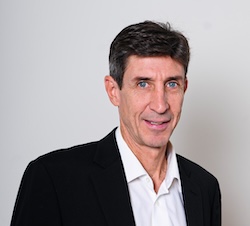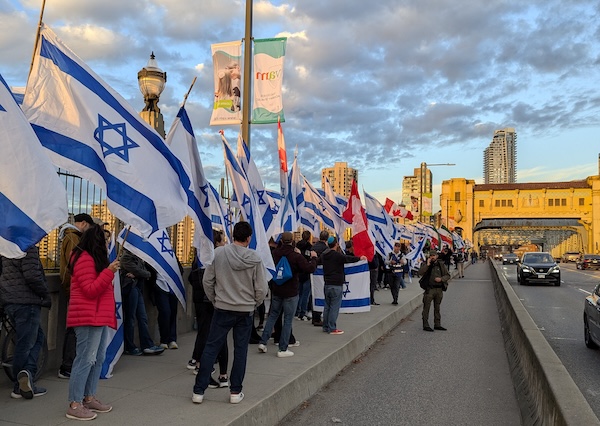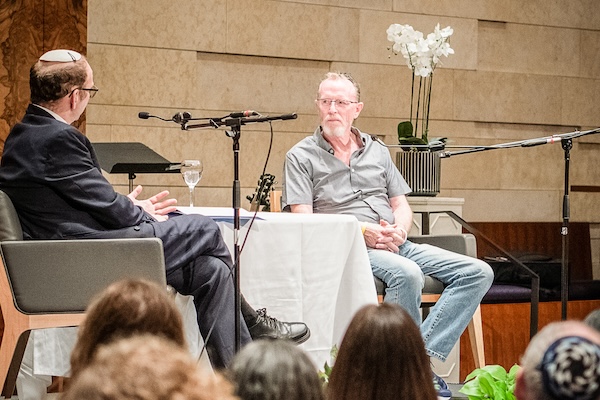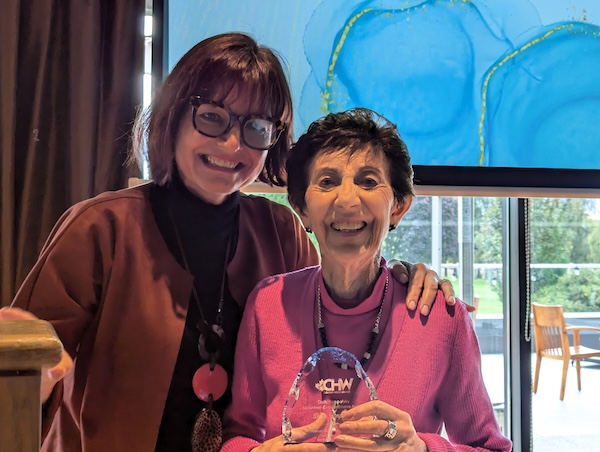It turns out that a war and a worldwide increase in antisemitism may cause more Jewish people to return to Jewish spaces. Some Jewish atheists try out fasting for Yom Kippur. New faces appear at synagogue. Lectures and events that were sparsely attended in the past seem to have more takers. If you’re a regular in a Jewish community, you may have seen this already. There are many reasons, including a need to find community and avoid antisemitism, or to return to religious practice after dealing with so much death. For those who were already attending or even occasionally attending Jewish services or events, things have also changed.
My twins had their b’nai mitzvah in June. I’d long thought of how cool it would be if they could help fill out a minyan more often (a group of 10 needed for communal prayer). However, there have been obstacles. Our congregation’s building was under renovation. The temporary spot, while lovely and hospitable, required a car ride.
This fall, the congregation moved back to its building and we live in easy walking distance. My kids attend public school and didn’t have Sukkot off. Yet, when one kid asked to attend minyan on Hoshanah Rabbah, the last day of Sukkot, I immediately said yes. He would have “an appointment” that morning, according to the attendance sheet, and arrive a little late. We figured, no need to claim a religious holiday (antisemitism concerns, again), but that’s what it was, of course.
Hoshanah Rabbah was a new experience for us, though it’s an ancient ritual. It involves circling the pulpit (a stand-in for the Temple altar) seven times, with lulav and etrog in hand. Marking the end of the fall holidays, it’s a last chance to ask for forgiveness and a better year.
Traditions differ about what is said during this ritual, but our congregation read piyyut, which are traditional poems, a part of Jewish liturgy that often includes acrostics (poems that use the alphabet). Some of the piyyut are very old. I found myself praying that my fruit trees don’t get fungus or that my fields wouldn’t be cursed. It might seem funny to ask for some of these things, but my city backyard has young apple, apricot, plum and cherry trees. I don’t want fungus!
It was especially poignant to pray – in the “Foundation Stone (“Even Shetiyah”) poem – about “the goodness of Lebanon, beautiful place, joy of the world.” This came straight out of the Siddur Ashkenaz (the Ashkenazi prayerbook), with specific quotes from Isaiah, Psalms and Lamentations. Our historic relationship with Lebanon is a rich one. Many of us, Israelis and diaspora Jews, would love to visit Beirut, the “Paris of the Middle East.” Some of us have ancestors who lived there, and we would like to see where they grew up or spent time. This urge isn’t new; our desire to have a good connection to Lebanon as a neighbour is ancient.
Then, we all were handed bundles of willows. We beat these on the lectern with force while saying, “Save your people and bless your heritage, care for them and carry them forever.” It was primal, cathartic, and very messy. There were willow leaves everywhere.
My kid was only a little late to first period art class. I went home in wonder. Later, I joked with one of my professors from graduate school, Jack Sasson, who I respect deeply, about how, for me, this previously unknown Jewish ritual felt stirring and exotic. He suggested that paganism still has something to teach us. The beating of the willows is ancient indeed. It’s a namburbi ritual from Mesopotamia, he said. When I remarked that I could get into this paganism thing, his reply left me laughing. “Ishtar will welcome you.”
I was still reflecting on all this when watching some new friends with young kids dancing on the evening of Simchat Torah. To help everyone through the first yahrzeit of Oct. 7/Simchat Torah, our rabbi dedicated each hakkafah (circuit around the room with the Torahs) to a different group: first responders, those who had died in the past year, the unity of the People of Israel, etc. The next afternoon, the kids came over for snacks and to play. One of the parents asked me why there was so much reference to Israel stuff. I realized that here, too, was a confluence of old customs and new experience.
I explained that some of these prayers, for instance, the prayer for the hostages, weren’t new. The Talmud, codified in 500 CE, discusses the topic of hostages at length. The first instance of the prayer for the redemption of hostages that we use today was documented in the Mahzor Vitry, named for Simhah b. Samuel of Vitry, a French talmudist who died in 1105 CE.
I reminded them that many present at the synagogue were in mourning for people who had died. While celebrating old holidays, we need to acknowledge the current situation. These days, services usually include prayers for the state of Israel and the Israeli army, too. None of these are newly written prayers.
Of course, Sukkot itself, a harvest festival that required Israelites to go to the Temple in Jerusalem – last destroyed in 70 CE – is also all about Israel.
I drew a few conclusions from these social encounters. First, for those who may feel jaded and aware of Jewish yearly events, there’s always something new to learn. For me, it was the primal connection to Mesopotamia, namburbi ritual and, yes, Ishtar, the goddess herself. For those who hadn’t been at synagogue for some time, there were many questions, new encounters and experiences, too. What unites it all is a realization that, while our individual learning curve might be new to us, the rituals, the prayers, and the historic connections to Israel are ancient.
For all of us, in a time when political rhetoric seeks to disconnect diaspora Jews from the land of Israel, Sukkot and Simchat Torah were a powerful – and timely – reminder of our past and our future, together.
Joanne Seiff has written regularly for the Winnipeg Free Press and various Jewish publications. She is the author of three books, including From the Outside In: Jewish Post Columns 2015-2016, a collection of essays available for digital download or as a paperback from Amazon. Check her out on Instagram @yrnspinner or at joanneseiff.blogspot.com.










